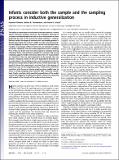Infants consider both the sample and the sampling process in inductive generalization
Author(s)
Gweon, Hyowon; Tenenbaum, Joshua B.; Schulz, Laura E.
DownloadSchulz-2010-Infants consider.pdf (977.9Kb)
PUBLISHER_POLICY
Publisher Policy
Article is made available in accordance with the publisher's policy and may be subject to US copyright law. Please refer to the publisher's site for terms of use.
Terms of use
Metadata
Show full item recordAbstract
The ability to make inductive inferences from sparse data is a critical aspect of human learning. However, the properties observed in a sample of evidence depend not only on the true extension of those properties but also on the process by which evidence is sampled. Because neither the property extension nor the sampling process is directly observable, the learner's ability to make accurate generalizations depends on what is known or can be inferred about both variables. In particular, different inferences are licensed if samples are drawn randomly from the whole population (weak sampling) than if they are drawn only from the property's extension (strong sampling). Given a few positive examples of a concept, only strong sampling supports flexible inferences about how far to generalize as a function of the size and composition of the sample. Here we present a Bayesian model of the joint dependence between observed evidence, the sampling process, and the property extension and test the model behaviorally with human infants (mean age: 15 months). Across five experiments, we show that in the absence of behavioral cues to the sampling process, infants make inferences consistent with the use of strong sampling; given explicit cues to weak or strong sampling, they constrain their inferences accordingly. Finally, consistent with quantitative predictions of the model, we provide suggestive evidence that infants’ inferences are graded with respect to the strength of the evidence they observe.
Date issued
2010-05Department
Massachusetts Institute of Technology. Department of Brain and Cognitive SciencesJournal
Proceedings of the National Academy of Sciences of the United States of America
Publisher
National Academy of Sciences (U.S.)
Citation
Gweon, H., J. B. Tenenbaum, and L. E. Schulz. “Infants Consider Both the Sample and the Sampling Process in Inductive Generalization.” Proceedings of the National Academy of Sciences 107.20 (2010): 9066–9071. Web.
Version: Final published version
ISSN
0027-8424
1091-6490